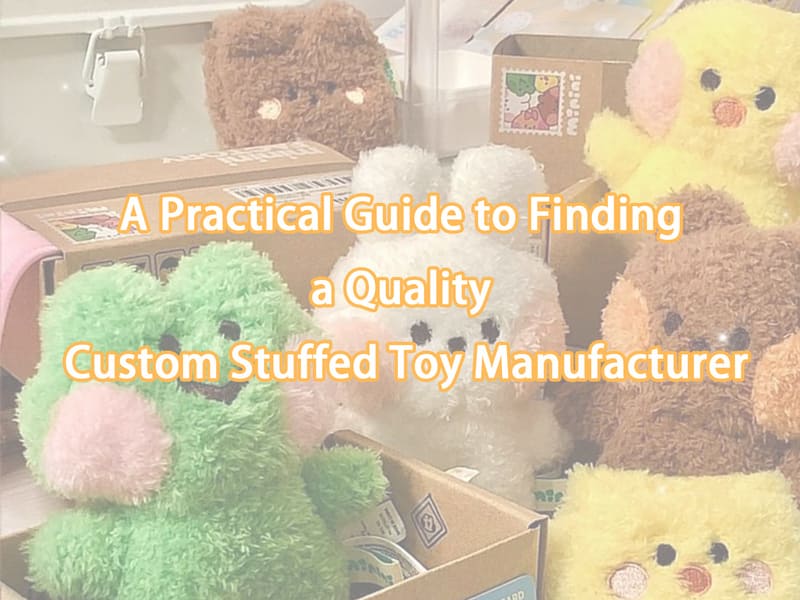
A Practical Guide to Finding a Quality Custom Stuffed Toy Manufacturer
Table of contents |
|
1.What Defines a Professional Custom Stuffed Toy Manufacturer? |
|
2.Key Steps in Custom Stuffed Toy Production: From Concept to Final Product |
|
3.How to Identify a Manufacturer Worth Partnering With |
|
4.Practical Tips: Key Steps for Effective Communication with Your Manufacturer |
|
5.Avoiding Pitfalls: Common Mistakes Newcomers Should Watch For |
As brands place greater emphasis on personalized expression and emotional connection with users, custom stuffed toys are gradually becoming vital tools in corporate promotions, IP development, creative gifting, and more. Whether it's a game character, company mascot, personal memento, or pet replica, a custom stuffed toy provides a friendly, warm, and shareable way to turn creativity into a tangible product.
This demand comes not only from companies but increasingly from individual consumers. More and more people want to use unique plush toys to express feelings, commemorate memories, or deliver blessings. These customizations require higher standards in detail, material, appearance, and texture, which also sets a higher bar for the custom stuffed toy manufacturer in terms of design, craftsmanship, and quality control.
Therefore, finding a professional and trustworthy manufacturer becomes a crucial step in the customization process. This guide offers practical and systematic advice to help you make a wise choice among many manufacturers.
What Defines a Professional Custom Stuffed Toy Manufacturer?
A qualified custom stuffed toy manufacturer must possess comprehensive capabilities in design, production, quality control, safety standards, and communication to fulfill diverse customization needs. Key indicators include:
-
Strong design realization capabilities: Ability to turn sketches, reference photos, models, or textual concepts into real-life samples with high fidelity and a pleasant feel.
-
In-depth understanding of materials and structure: Knowledge of plush fabrics (e.g., short-pile velvet, crystal fleece, PV plush), fillings (PP cotton, beads), structural elements (magnets, sound boxes), and suitable application scenarios (children, pets, exhibitions).
-
Possession of safety and quality certifications: Such as ISO9001, CE, EN71 (EU toy safety), ASTM F963 (U.S. toy safety), ensuring smooth export and compliance with regulations.
-
Stable sample-to-production workflow: Includes a dedicated sample department, sample approval process, and the ability to reproduce details reliably in mass production.
-
Clear pre-sale and after-sale communication system: Quick responses on sample revisions, quotation updates, and shipping arrangements are vital for efficiency and trust.
Top manufacturers often offer one-stop services covering consultation, sample development, mass production, packaging, and export logistics, greatly reducing communication costs and improving project efficiency.

Key Steps in Custom Stuffed Toy Production: From Concept to Final Product
Every stage in the process affects the final outcome and delivery time. The general procedure includes:
- Submit creative concept and reference materials:Provide images, character designs, descriptions, or size specifications. The more detailed, the better for accurate interpretation
- Cost evaluation and initial quotation:Based on design complexity, size, materials, and quantity, the manufacturer estimates production costs and timelines.
- Sample development and approval:This is the most critical phase. Sampling usually takes 7–15 days. The final approved sample serves as the blueprint for production.
- Mass production and quality control:Production follows the approved sample. Emphasis is placed on fabric consistency, sewing quality, and quality checks throughout.
- Packaging and shipment:Options range from basic packaging to customized boxes, tags, and manuals. Delivery can be arranged via express, sea, or air freight.

How to Identify a Manufacturer Worth Partnering With
When faced with countless factories online, use the following criteria to filter high-quality custom stuffed toy manufacturers:
- Do they have real manufacturing capacity?Verify they are not a middleman. Request factory photos, videos, or live tours showing equipment, staff, and production lines.
- Are they legally compliant and certified?Check for business licenses, export qualifications, and relevant certifications like EN71, ASTM, ISO.
- Do they have verifiable project experience?Ask for previous case studies or sample photos similar to your style to gauge their skill level.
- Is their quotation and contract transparent?A reliable supplier provides detailed pricing, timelines, and terms regarding delivery, revisions, and after-sales service.
- Do they communicate efficiently?Fast and clear responses—within 24 hours—on sample feedback or revisions indicate good project management.

Are you looking for the right custom stuffed toy manufacturer? Want affordable prices? You have come to the right place. We are committed to providing quality products and offering the best value to our customers. Your satisfaction is our motivation. Send an email to Minazheng@xll-group.com now and our manufacturers will serve you wholeheartedly.
Practical Tips: Key Steps for Effective Communication with Your Manufacturer
Improve collaboration and reduce errors by following these best practices:
- Prepare a detailed specification document,Include size, colors, functional requirements (e.g., sound or lighting), filling type, and packaging preferences.
- Clarify sampling process and approval mechanism,Request photos, videos, or a physical sample before confirming. Ensure your input is incorporated before mass production.
- Confirm timelines and payment terms,Use milestone payments (e.g., sample fee upfront, 30% before mass production, balance before shipping) to reduce risk.
- Request material safety reports and certificates,Essential for exports or toys intended for children. Compliance ensures smoother customs clearance and platform approval.
- Establish stable communication channels,Use consistent tools like email, WeChat, or WhatsApp with agreed check-in frequencies to ensure alignment.
Avoiding Pitfalls: Common Mistakes Newcomers Should Watch For
New clients may fall into these traps due to lack of experience:
- Choosing suppliers based on low prices: Quotations that are too low may mean sacrificing material quality, production processes, or quality control. Be sure to find the best balance between cost and quality.
- Approving samples without careful inspection: Skipping sample review or confirming only by photos may result in product deviations in structure or appearance. Be sure to conduct a detailed sample inspection.
- Underestimating shipping and customs processes: Ignoring holiday arrangements, customs document preparation, or shipping time often leads to shipment delays. Be sure to plan logistics in advance.

